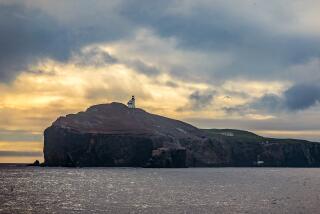Superintendent Removed From Channel Islands
- Share via
Tim Setnicka, the hard-charging, controversial superintendent of Channel Islands National Park, was abruptly transferred last week, leaving his professional future and that of several major island restoration projects in limbo.
Setnicka, head of the five-island park and marine sanctuary park since 1997, will work in the National Park Service’s western regional office in Oakland, where he will perform as yet unexplained duties, officials said.
“We don’t know the reasons why, but this happens with park service people,” said Tom Dore, spokesman for the park. “The job in Oakland is not permanent. We don’t know what he will be doing yet. He seemed happy when I talked to him. Maybe a combination of his skills are needed for another job; we just don’t know.”
Chief ranger Jack Fitzgerald will serve as acting superintendent until a permanent replacement is found.
Setnicka, an Ojai Valley resident, could not be reached for comment.
The move comes at a critical time for the park, which has animal and plant species found nowhere else in the world.
Ongoing projects that could be affected include an aggressive campaign to kill rats that feed on seabird eggs on Anacapa Island. On Santa Cruz, the largest of the islands, rangers are trapping golden eagles, restoring bald eagles and planning to shoot 4,000 wild pigs. Meanwhile, plans are underway to expand camping and hiking facilities on two of the islands.
“There are a lot of things going on at the Channel Islands, and I have a great deal of worry about a change in leadership,” said Greg Helms of the Ocean Conservancy in Santa Barbara, a national group dedicated to maintaining ocean ecosystems.
“People forget that resource management has a lot to do with individual people and relationships,” he said. “To that extent it will be a blow to us.”
Setnicka, an avid rock climber, diver and kayaker originally from Chicago, became superintendent after nearly 30 years as a park ranger in Alaska, Hawaii, Florida, Wyoming and California.
He earned a reputation for being tough -- someone who identifies a problem and attacks it full force. But his brusque style sometimes backfired, leading critics to call him arrogant and overly aggressive.
The most glaring example of this was a 1997 raid on two sheep-hunting camps on Santa Cruz Island. Twenty heavily armed federal and local law enforcement officers descended on the camps in a Blackhawk helicopter after getting reports that hunting guides had destroyed Chumash graves and others were operating without licenses.
“I feel he gave the park service a real black eye,” said Jaret Owens of Oxnard, who organized sheep hunts on Santa Cruz. “I have gone on with my life, but this guy destroyed my business.”
Andre Barclay, a ranch manager in Carpinteria, was so distressed by the raid that he started a Web site dedicating to attacking Setnicka.
“After the raid, I felt he was an irresponsible person,” he said. “The guy was out of control.”
But others supported the action.
“You are going on a hunting ranch where people have guns; I can’t fault them for their method,” said Julie Tumamait-Stenslie, a Chumash tribal member. She has worked closely with Setnicka to help preserve Native American archeology and history on the islands.
“He always had a generous ear for our community and for what we wanted to accomplish,” she said.
Helms said he liked Setnicka’s blunt style but worried about how others perceived it.
More to Read
Sign up for Essential California
The most important California stories and recommendations in your inbox every morning.
You may occasionally receive promotional content from the Los Angeles Times.













